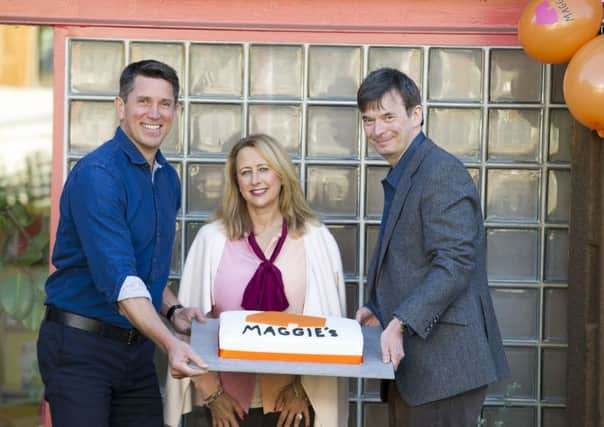Another brick in the wall for Maggie's care


As the blueprints were drawn up and the initial phase of construction got under way, she spoke of her hopes that one day, there would be a range of these centres up and down the country, providing unparalleled emotional and practical support for thousands of cancer patients.
Now, as the first Maggie’s centre celebrates it’s 21st birthday with a portfolio of 21 other facilities across four countries and two continents – her dream has finally been realised.
Advertisement
Hide AdAdvertisement
Hide AdBackers including Rebus author Ian Rankin joined dozens of former and current staff, fundraisers and ex-patients at the centre yesterday, to help celebrate the milestone year with the announcement that £1.2 million of funding had been secured to begin construction on a new extension which will help staff cope with an increasing demand.
Maggie was inspired to develop a new approach to care after being diagnosed with terminal breast cancer in 1993 and left to digest the news alone in a hospital corridor.
She passed away in 1995, a year before the first centre opened. However her legacy lives on through the centre’s name – including facilities in Hong Kong and Tokyo.
Rankin, who has been a long-term supporter of the project, revealed he was inspired to get involved after seeing the support offered to patients at Maggie’s was in stark contrast to what was available to his mother when she lost her battle with the illness in 1979.
Advertisement
Hide AdAdvertisement
Hide AdRankin said: “Maggie’s goes beyond a sticking plaster, it’s a support network and it’s something that’s an emotional support network, which professionals, doctors, cannot provide because they don’t have the time to do it. It’s another brick in the wall.”
“They are able to say; ‘look, you are not just a statistic in a hospital, you are a human being. We are going to treat you like a friend. You can come here and have a cup of tea and a chat in a way that is not always possible with professionals.”
He continued: “There was nothing like Maggie’s around at the time when my mum did get cancer and I am aware of the unrest and upheaval that it can put on a family when they don’t have that kind of support network around them.”
Architect Richard Murphy, who designed the original building in 1996, as well as the first extension put in place back in 2001, said he “could never have imagined” how the project would grow over the next 21 years.
Advertisement
Hide AdAdvertisement
Hide AdHe added: “We all used to say it was a great idea and Maggie would tell us we were going to have these all over the country and I think some of the more cynical people, myself included, would sort of nervously smile.”
“Looking at it now, I think Maggie would be proud of what has been achieved here.”
In its 21-year history, more than 420,000 people have passed through the doors of the Edinburgh centre from all over the world.
Heather Brooks, 35, first came to the centre five years ago after husband Lee was diagnosed with stomach cancer. Lee lost his battle with the illness in 2013 and despite Heather’s initial reservations about returning to the centre afterwards, she was amazed by the support she has been given since. She said: “I have felt at times, maybe it’s time to step away and let other people get their chance, but they still support me even years later and now I’m fundraising myself to give something back.
Advertisement
Hide AdAdvertisement
Hide Ad“I have never been much of a talker, not one to open up. But when me and Lee came here as soon as he was diagnosed, we talked through his whole illness.
“I have continued to come here since then and I don’t think I would be in half as good a place as I am if it wasn’t for talking to the people here.
“That is what they do. You are never the first to have gone through something and no one is ever too busy to sit and talk.”
Brian Jade, 71, was told he had kidney cancer in 2013 and said he was in a “dark place” following his diagnosis.
Advertisement
Hide AdAdvertisement
Hide AdHowever, he admitted staff at the centre had helped him “turn his life around” after wife Avril organised a visit three days later. He has since recorded a charity album for the centre alongside his band, The Elderly Brothers.
“After I was diagnosed, I lost a kidney, they told me I had maybe one or two weeks to go and that was just devastating,” he recalled.
“When I came here, me and Andrew must have sat and spoken about my diagnosis for about an hour and I saw that Maggie’s was different to a hospital.”
He added: “The entire centre is just a godsend.”